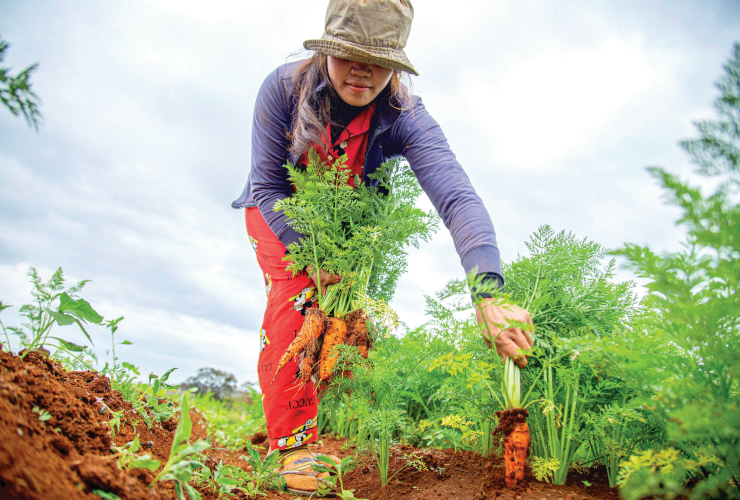While many people will turn to air conditioning as a heatwave rolls across Eastern Canada this week, thousands of farm workers will have few protections keeping them safe.
The National Farmers Union (NFU), a grassroots organization advocating for farmers across Canada, is calling for stronger heat protections for its workers.
The NFU is advocating for provinces and territories that do not currently have heat protections to develop specific mandatory occupational health and safety measures, which could look like workplaces being required to offer shade and cooling areas for workers, access to clean water, access to bathrooms, heat stress information being communicated in the workers’ native language, and more.
The situation could be especially dire in Ontario, where the onus is on employers to “take every precaution reasonable in the circumstances for the protection of a worker” — a catch-all that isn’t specific to either heat or agricultural workers. As of now, six provinces such as British Columbia and Saskatchewan have regulations for heat stress, while four provinces have blanket clauses like Ontario.
Ontario has the largest number of agricultural workers in Canada, but they don’t have the right to join a union based on a longstanding exclusion, explains Hannah Kaya, an organizer with NFU and farm worker in Quebec. Many farm workers are also not protected under provincial minimum wage laws.
“There's no mandatory rest periods for farm workers, which is an enormous climate hazard. You don't have workers feeling that they can actually take the breaks that they would need in order to be responsible in the heat,” said Kaya, noting that the whole workforce is “especially vulnerable because of legislative exclusions.” She says there should be policies requiring workers to take rest and water breaks in the shade when it's hot, because optional ones will likely not be utilized.
The World Health Organization notes that extreme heat “compromises the body’s ability to regulate temperature and can result in a cascade of illnesses, including heat cramps, heat exhaustion, heatstroke, and hyperthermia.”
In response to the call from the NFU, Ontario’s Ministry of Labour noted that all workers have a right to refuse unsafe work and should report complaints, which are then investigated by the ministry.
“Specific to heat stress, the employer should establish a heat stress control plan for the summer to manage job tasks in high temperatures and humidity,” the labour ministry wrote in an emailed statement. “Employers should have policies and procedures for each situation to protect workers which may include control measures such as engineering controls, safe work practices, administrative controls and the use of personal protective equipment, if necessary.”
Migrant workers
Those existing occupational health and safety measures aren’t working in the heat, explained Kaya, especially for the over 20,000 migrant farm workers that come to the province each year. A March 2023 report by the Canadian Environmental Law Association, which documents the experience of agricultural workers in heat, found that “migrant workers reported abusive practices by employers which exacerbate the risks of extreme heat,” including instances of workers not being allowed to bring water to work, having limited access to shade and not enough breaks.
While Canada has patchy data about deaths and illnesses due to extreme heat on the job, the United States has clear figures: there were 36 work-related deaths due to environmental heat exposure in 2021 and 436 in total since 2011.
The call from NFU follows a campaign launched last month by the Ontario Federation of Labour, also calling for heat protection legislation from the province. Ontario NDP MPP Peter Tabuns joined the federation’s campaign and spoke out against Doug Ford’s Progressive Conservative government, which performed heat stress consultations last August, but has yet to make policy changes.
Tabuns is set to introduce a motion in the legislature to revise health and safety legislation to include heat protections. Kaya stressed a clause is needed that specifically mentions farm workers. If not, “they'll find some way to make the exclusion explicit. And we know we're a very vulnerable sector, so whatever advocacy work we do for other industries needs to apply to farm workers,” she said.
Kaya and her coworkers are doing their best to keep each other safe during this heatwave: taking more breaks, starting earlier to avoid peak heat, drinking more water – which, she acknowledges, not all farmworkers can do.
“We're doing a bit of everything that you can do when you have these very tight deadlines, which we all have on the farm,” she said. “...the tomato doesn't care if you're roasting in the field. The tomato needs [to be] harvested when it's ripe.”
This is truly hard working in
This is truly hard working in the fields, even on the best weather conditions, let alone during extreme heat days we experience most summers. Most Canadians have zero clue about these working conditions and the fact many of the people who work the fields are foreign workers. It seems this kind of work is beneath most Canadians and take for granted the fresh produce that end up on their tables. Then it makes me laugh as I hear people on public transit complaining about a little heat while in transit because the AC unit can't keep up with the heat. To give them a dose of reality, they should spend a day in the fields and then have something to really complain about.
To make it even worse, these are low paying jobs for the hard work they do and should be paid more. However, you won't find too many Canadians willing to pay more for fresh produce to ensure these workers receive a living wage.







Comments